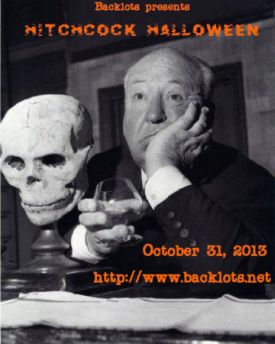 This is the SBBN entry for the Hitchcock Halloween Blogathon, hosted by Backlots. Check out their blog today for all the great entries — and Happy Halloween, everyone!
This is the SBBN entry for the Hitchcock Halloween Blogathon, hosted by Backlots. Check out their blog today for all the great entries — and Happy Halloween, everyone!
***
Charlie Newton (Theresa Wright) has decided in a fit of late-teen pique that her family life needs some shaking up, that the small-town drudgery — and her father caring more about money than souls — was hurting them all. She decides Uncle Charlie was just the one to shake everything up and fix their problems. Unbeknownst to her, at the same time, her uncle Charlie Oakley (Joseph Cotten) is heading straight for her in the quiet town of Santa Rosa, California. Uncle Charlie is well-loved, his sister Emma (Patricia Collinge) having doted on him as a child, his niece Charlie idolizing him, and the entire small town of Santa Rosa impressed with his charm and business acumen. Soon it becomes clear that Uncle Charlie has a terrifying secret, and young Charlie finds herself in danger as she pieces together the truth about her uncle’s life.
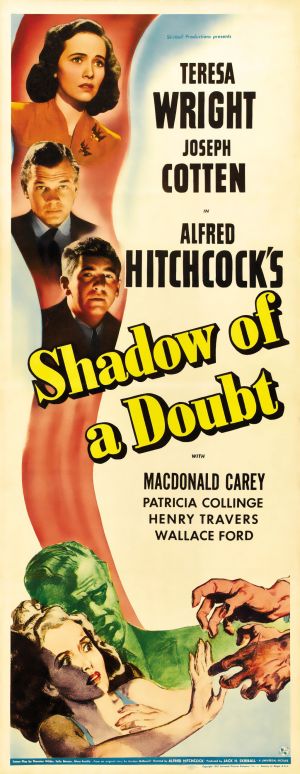 Director Alfred Hitchcock often said that Shadow of a Doubt was his favorite of all his own films, and it must have pleased him greatly to receive such positive reviews on its release. Many critics in the UK felt the film was the first to show Hitchcock had finally settled into his new American artistic life, while American critics fell toward praising its wartime message of being cautious of slick evildoers hiding in plain sight.
Director Alfred Hitchcock often said that Shadow of a Doubt was his favorite of all his own films, and it must have pleased him greatly to receive such positive reviews on its release. Many critics in the UK felt the film was the first to show Hitchcock had finally settled into his new American artistic life, while American critics fell toward praising its wartime message of being cautious of slick evildoers hiding in plain sight.
Hitch catered to wartime sentiment, slowly escalating the reminders of the war from only few at the beginning of the film, usually accompanying Uncle Charlie’s vague anti-government beliefs, to a third act absolutely packed with extras in uniforms and War Bonds signs. There was more to Shadow of a Doubt than pro-Allied sentiment, of course, but critics, such as the perpetually sniffy Bosley Crowther of The New York Times, often dismissed any hint of sociopolitical commentary, Crowther going so far as to say the potentially “anti-social” moral of the film was its only flaw.
Given Crowther’s tendency to praise films that upheld the social status quo, it’s likely that he was irked at the film addressing the expansion of women’s lives beyond the role of homemaker. When we first see young Charlie, she’s brooding in her room, freshly graduated from high school and indirectly pondering the role of women in society by thinking about her mother, how she did so much for the family but without any substantial reward beyond the satisfaction of doing the one job society said women were suited for. Throughout the film, Charlie exhibits a fierce loyalty and protection of her mother; she’s the future of women in the Western world, wishing her mother’s generation had the opportunities she has had.
In Shadow, the question quickly arises: Does Charlie really have those opportunities she assumes? Her beloved Uncle Charlie is revealed to be a serial murderer, a strangler of widows who, due to their circumstances, are no longer living their lives to serve a husband but rather enjoying what the husband has left behind, and all for themselves. He preaches the charm of the good old days, spits out vile invective against women who exercise free will, yet no one but his niece seems to notice much wrong with what he says. By the end of the film, young Charlie is both mourning her childhood adoration of her favorite uncle, and questioning the very society she lives in, the clash between her presupposed freedoms and the reality of what American society will actually allow her to do.
Shadow of a Doubt mixes themes from thrillers, films noir and horror movies, the latter being especially notable in the character of Uncle Charlie. As James McLaughlin so thoroughly detailed in his essay All in the Family: Alfred Hitchcock’s Shadow of a Doubt, Charlie resembles nothing so much as a vampire, even Dracula himself. He is never photographed; he seems to disappear from rooms and streets with supernatural skill; when he is first introduced, he rises from his bed like Dracula straight out of his crypt. But there is also a haze of smoke around him constantly, from the ever-present cigar to the train that he arrives on, and there is the constant talk of his own personal Hell: He’s as much the devil as he is Dracula, with unspoken temptations ready to damn the eternal souls his niece had been so worried about.
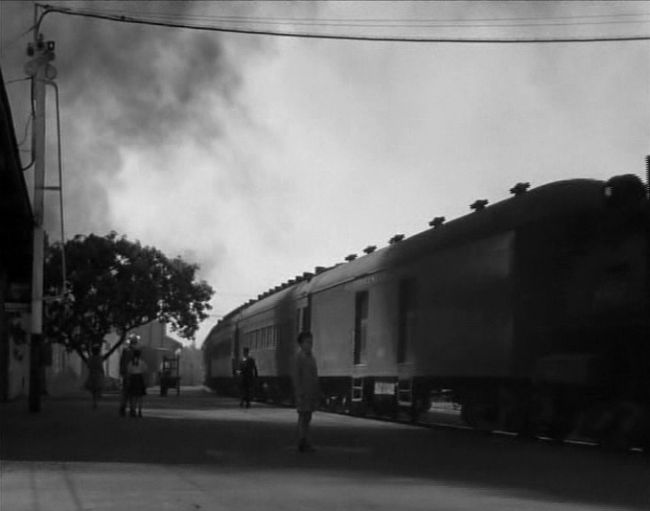 Dark shadows cast by the train that brings Charlie into town.
Dark shadows cast by the train that brings Charlie into town.
When reminded of widows and his own crimes, Uncle Charlie slips into reveries of old-fashioned waltzes from the 1880s. These are necessarily invented memories — they cannot be his own, he is simply not old enough — and represent not only his own repressed sexuality but a time when women were subservient, far more reliant on men. It’s this threat of female independence that brings Uncle Charlie to try to kill young Charlie by locking her in a garage with a car running. She has been independent throughout the film, often going places by herself, even at night, and driving on her own. This stands out as unusual in a film of this era, especially after a brief moment early on when her father grouses about his sister-in-law, assuming that because she had just received her driver’s license, she had already been in a wreck. Charlie had planned to drive the family to Uncle Charlie’s speech the night she ends up almost suffocating in an exhaust-filled garage, and her uncle’s attempt on her life by trapping her in the garage — killing her by the car that allows her independence — was both expedient and symbolic.
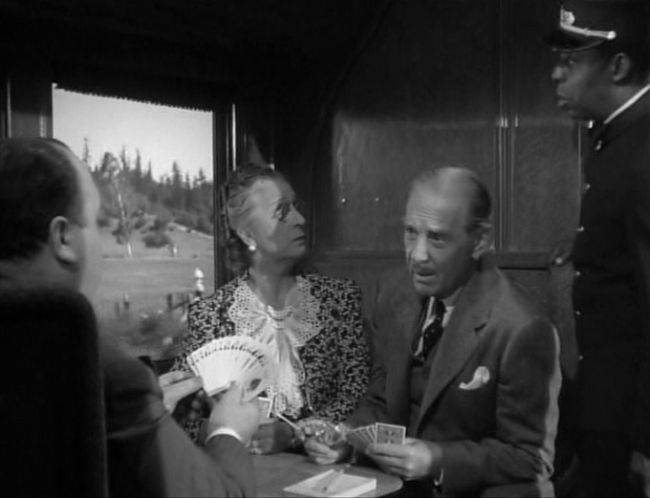 Hitch’s cameo about 19 minutes in. You only see him from behind, and though he’s holding all the cards, they’re the ace of spades, followed by the rest of the suit underneath.
Hitch’s cameo about 19 minutes in. You only see him from behind, and though he’s holding all the cards, they’re the ace of spades, followed by the rest of the suit underneath.
Further, it’s the same garage Uncle Charlie saw his niece and the police officer Jack Graham (Macdonald Carey) have an intimate discussion in, Graham proclaiming his love for her, and her tepid response, though not an outright rejection. This triggers both the sexual jealousy of Uncle Charlie, as well as his irritation that his niece may not want to immediately marry and become, as he sees it, a proper woman, i.e. a homemaker above all else. He espouses what critic Robin Wood referred to as “the reaffirmation of family and small-town values” while, seemingly without realizing it, being the agent that threatens such a thing by his arrival in the town.
Charlie and her uncle share a sort of telepathic relationship, “like twins” as young Charlie tells him. It plays to a rather cheeky version of the good twin/evil twin dynamic, as young Charlie is astonishingly virtuous, wholesome and honest, except for the small matter of having a sexual interest in her own uncle. He seems to share the sentiment: When Uncle Charlie arrives, she makes sure he has her room, therefore will be sleeping in her bed. Once he enters her room, he gazes at her graduation photo, then plucks a flower from her dresser, looks back at his niece’s bed, then sticks the flower in his lapel.
Uncle Charlie’s sexual interest extends towards his sister Emma, too, who took care of Charlie as a young boy when he had a nasty accident. Since they’re all related, the usual rejection of the family unit is implied with the incest theme, with Charlie being the direct threat to the family because his arrival makes manifest these repressed Freudian desires. Further, since both Charlies are psychic “twins,” it means that, on some level, young Charlie has a sexual interest in herself, and of course an interest in her hidden evil side, which her uncle represents. Beyond that, his was a blatantly Freudian childhood, defined by a bicycle accident causing a traumatic head injury that nearly killed him. Doted on by his mother and eldest sister, he emerged with a changed personality, no longer easygoing but frequently acting out. One cannot help but wonder if it was the excessive smothering by mother figures — or, perhaps, the end of the spoiling once he was healed — that was more responsible for Charlie’s psychosis than the head injury itself.
But sexual interest on the part of women is, again, a matter of freedom, and Charlie’s good friend Catherine (Estelle Jewell, a pretty, fulsome young local hired on for the small part) enjoys this freedom all too well: she can be seen constantly sizing up any man she happens upon. Charlie’s younger sister Ann (Edna May Wonacott) talks of marriage, too, wanting a librarian for a husband to ensure constant access to books. These are women and girls exercising their right to choose a husband and sexual partners, though with Ann, it’s clear that thought hasn’t even remotely entered her mind yet. The idea of choice is already planted firmly in her psyche, however, and it’s a safe bet Uncle Charlie wouldn’t approve.
Uncle Charlie clearly has sexual relationships with the widows he ultimately dispatches, even though it’s their freedom to be able to choose sex partners that he detests. One should always remember that the “fat, wheezing animals” he spits at in his most venomous and chilling speech are also women that he sleeps with; there is some self loathing there, certainly, and a criticism of women who don’t fit the specific archetype America has set for them to outwardly present themselves as “good.” They exist for their own pleasures, a luxury Charlie seeks to eradicate, even as he gets his own pleasure from it. It’s likely he explains away this inconsistency by reassuring himself that he’s controlling their sexual needs; in fact, much of his attentions toward his own sister and niece are surely as much about male control over women as it is about the sex itself.
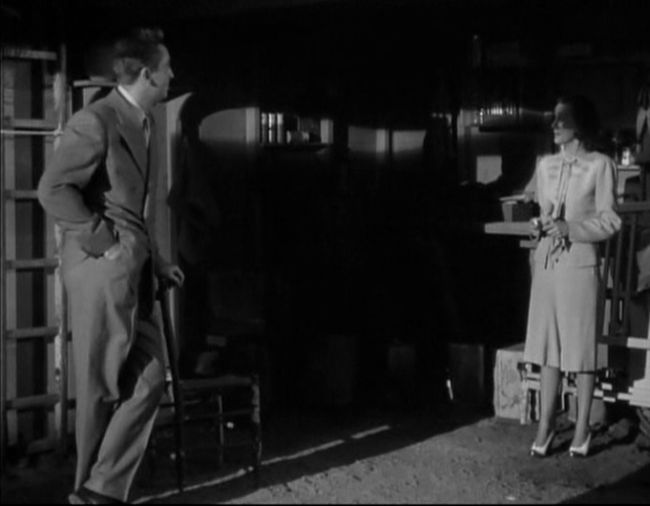 Some nasty shadows as Jack professes his love to Charlie.
Some nasty shadows as Jack professes his love to Charlie.
Uncle Charlie’s ideals of how women should look and behave are seen as sociopathic, but because they so closely align with common Western ideals of thin, conventionally attractive women who are happy to just be mothers and wives, it’s disconcerting, at least to a critic like Bosley Crowther. Charlie easily slithers under the radar of most people because his evil is only a step or two too far outside socially expected behaviors. And because it’s a wartime film, the theme of evil lurking at home resonated on the conscious level for the audiences of the day, a metaphor for the “Loose Lips Sink Ships” paranoia regarding hidden saboteurs right under our own noses. It’s a theme Hitch had addressed many times in previous films, thus Shadow of a Doubt very easily played as wartime metaphor, making much of the remaining sociopolitical critique regarding expectations of women easy to bypass.
This dodging of the issue by many critics of the day is especially odd given the similarities between Shadow of a Doubt and The Little Foxes, released a year and a half prior to Hitchcock’s film. As many recent critics have pointed out, most notably Robin Wood, the character of Uncle Charlie represents the same ideals the sisters Regina (Bette Davis) and Birdie (Patricia Collinge) uphold in The Little Foxes. Regina strives to be a “merry widow,” the woman who holds a power that Uncle Charlie would find unnatural and repulsive. Birdie is the mothering woman, the one who stays at home to care for everyone else. But the toll each role has taken on these women has lead to their own destruction, and it’s Regina’s daughter Alexandra (Theresa Wright) who ultimately learns to balance both power and family, and leaves the house as the metaphorical future of women in American society.
It’s no coincidence that Hitch hired both Collinge and Wright for Shadow, and it’s probably not a coincidence that Theresa Wright was given top billing in an era where women, with only a couple of exceptions (Bette and Joan, essentially) were never given top billing anymore, even if they were the stars of the film. Critic and professor Elsie B. Michie goes so far to say that Shadow of a Doubt is a remake of Wyler’s The Little Foxes, which is perhaps overstating the case, though it’s unquestionable that both films were concerned with post-war society shifting women’s roles back entirely to the home. Later, this sociocultural shift would be integrated into the overall post-war effort, with women deliberately kept out of the workforce, their economic dependence on men being seen as a sign that America had returned to normal.
It’s possible, of course, given Hitch’s treatment of independent women later — think The Birds (1963) and Marnie (1964) — that Shadow of a Doubt was a cautionary tale, a warning to young women that there is a heavy price to pay when one desires freedom. The film can certainly be read that way, as when the authority figure of Jack Graham arrives. He not only has Uncle Charlie pegged as the Merry Widow Murderer, but he immediately sets upon young Charlie to tell her how to behave. It’s almost a pick-up artist maneuver when he gets her off her guard by lying to her, then telling her horrible news about her uncle, then browbeating her into believing she’s nothing special and that being ordinary is what she should strive for. Charlie is cowed almost into submission, but on the drive home — Jack drives, of course, not Charlie — she seems to get her strength back. It’s telling that later on, when Jack professes his love for her, she takes control of the situation and makes it clear she will decide how to proceed with the relationship, if at all.
There are many similarities to Psycho in Shadow of a Doubt, both in theme and in the cinematography, with a series of shots starting about an hour and 20 minutes into Shadow with Charlie at the bottom of the stairs like Arbogast in Psycho. This is followed by a low-angle canted shot focused on our resident psychopath, followed by Uncle Charlie looking out a second-storey front window down at the girl he wants to murder/possess, all of which were essentially lifted from Shadow and reused for Psycho.
The most moving moment of the film comes as an aside, during the fade out after Uncle Charlie realizes his niece has physical proof linking him to the Merry Widow Murders. He announces he has to leave suddenly, and his sister Emma breaks down. In a terrific, touching moment, Emma explains to all the women assembled in her parlor, their own heads bowed in understanding, that Charlie coming back to her made her remember her individuality: “You know how it is, you sort of forget you’re you,” she says as the camera focuses on her daughter, “You’re your husband’s wife…” as the scene fades to black, the reality of her mother’s words crushing Charlie, moving her to tears.
The irony, of course, is that Uncle Charlie may love his sister for being the devoted wife, but his arrival, rather than cementing her role as mother and housewife, temporarily liberated her. And it’s a shame we never see his direct reaction to this revelation, though we have to assume his decision to kill his niece by throwing her from the train is, in part, expressing hostility for his own sister’s desire for an independent life.
After young Charlie outmaneuvers her uncle and he falls from the train he had planned to toss her from, she keeps the secret to herself, with only her maybe-boyfriend and police officer also in on the truth. Everyone else still believes that Charlie Oakley was a saint among men. At the funeral, Charlie and Jack are alone, paired off at a church, which more than one analyst has claimed indicates a metaphorical marriage between the two, and Charlie’s acceptance of her ordinary, subservient role. Once her uncle has died, they posit, her uncontrolled desires die too, and she’s left with no options but to follow in the life her mother has chosen. James McLaughlin writes that this is an indicator of Hitch’s own fear of women’s sexuality, that Charlie has to be “tamed” by the finale for Hitch’s own comfort. But the pair are still outside the church, and these analyses are, I think, approaching the scene too cynically, despite the fact that Hitch does indeed often hold problematic issues with independent women.
By being outside the church, both Charlie and Jack are framed as being outside of society as a whole, primarily because of their knowledge of the truth about Uncle Charlie. Also, in Jack’s case, he is apart from society because his job requires him to wander around the country with false identities while chasing down criminals, disappearing so well that young Charlie wasn’t able to contact him when she was in danger, another factor against Charlie running to Jack for protection from the cruel harsh world. Both Jack and Charlie, I believe, have the choice to rejoin society if they want. For Charlie, however, it would mean accepting that ordinary life she was so afraid of, a life where she would have to marry, probably Jack, and pretend that her uncle’s beliefs and values didn’t exist in the world at large.
This is not a done deal, however, as the ending is far too vague and intangible to fully destroy the memories of Charlie’s exceptional intelligence and strength throughout the film. We remember her in the garage, taking control of her potential relationship with Jack, the sinister shadows marking the boring, middle class, small-town life as a threat to her very soul. We’ve seen Charlie time and again bounce back from psychological and physical danger, after being scolded by librarians and policemen, after Jack browbeats her on their first date, after each prior murder attempt. There is precious little to indicate that Charlie has been completely beaten down by this third and final attempt on her life, the one that ended up killing her uncle instead. At his funeral, there is still a moment of choice for Charlie, and the fact that she has chosen to leave the funeral service for her own emotional peace of mind, leaving her distraught family behind to mourn without her, indicates a strength of will in Charlie that has not yet been extinguished.
When realizing the strength Alfred Hitchcock was willing to bestow upon Charlie Newton, one can’t help but wonder why he would later destroy women like Annie Hayworth and Marion Crane for their sins. Perhaps because these women were not part of a family, and despite the icy criticism and satire Hitch lobbed at families during his cinematic career, he always seemed to regard the family unit as a bit of protection against the world. Young Charlie rails against the boredom of the bourgeoisie early in the film and needs her adventurous Uncle Charlie to rescue her from her fate, and perhaps in a skewed, psychopathic way, he does exactly that by ripping them apart. Perhaps Alfred Hitchcock wasn’t telling us the family was at stake, but that the family was the real problem, and once destroyed, true independence could be had.
***
Other Sources Not Linked Above:
Poster, lobby card and behind the scenes pictures from Doctor Macro’s incredible gallery of photos
The Films of Alfred Hitchcock by David Sterritt
“Unveiling Maternal Desires: Hitchcock and American Domesticity” by Elsie B. Mitchie from Hitchcock’s America, edited by Jonathan Freedman and Richard Millington
“All in the Family: Alfred Hitchcock’s Shadow of a Doubt” by James McLaughlin from A Hitchcock Reader, edited by Marshall Deutelbaum and Leland Poague

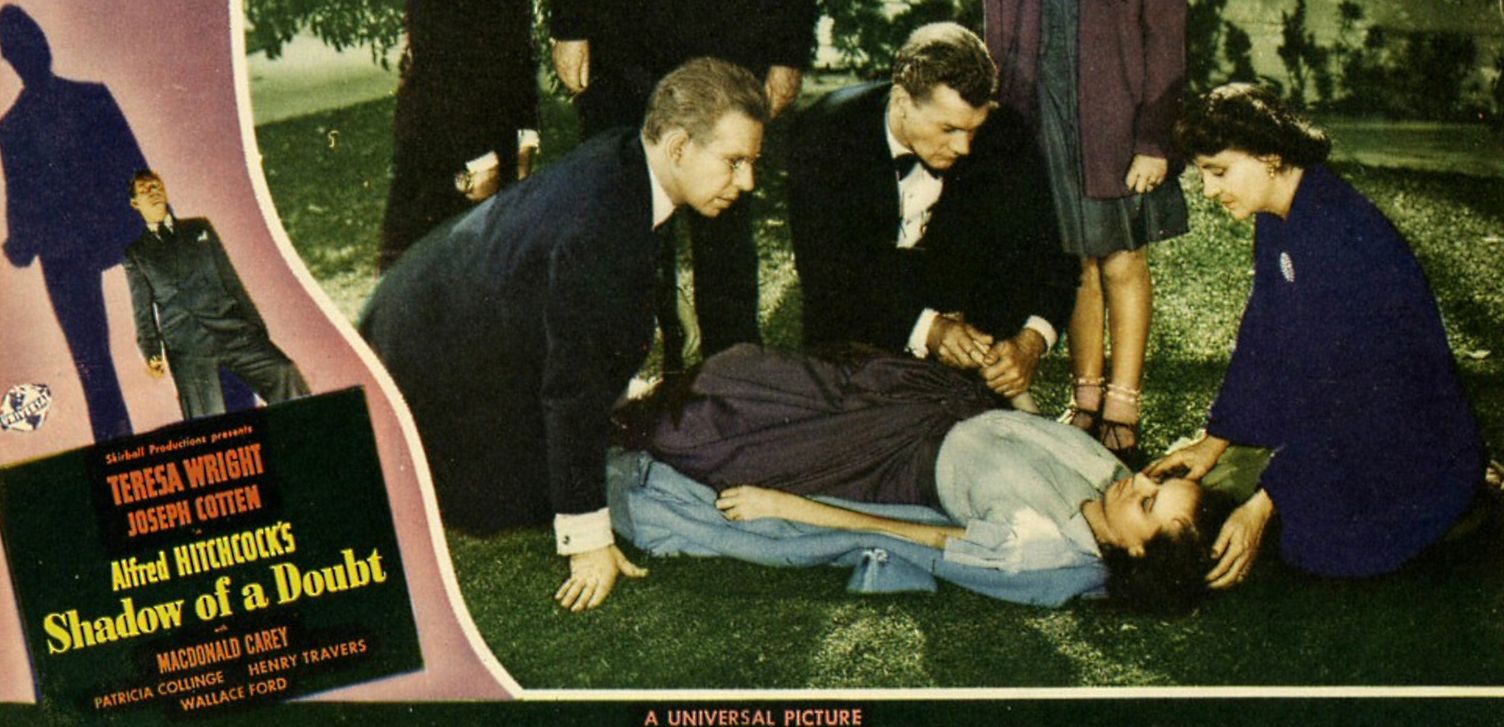
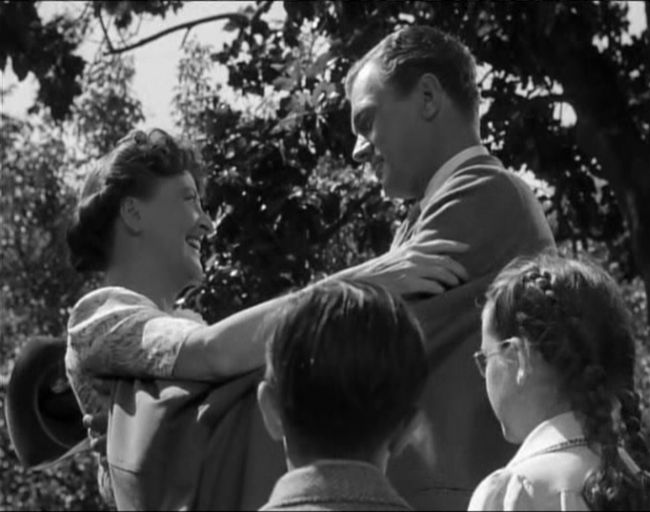
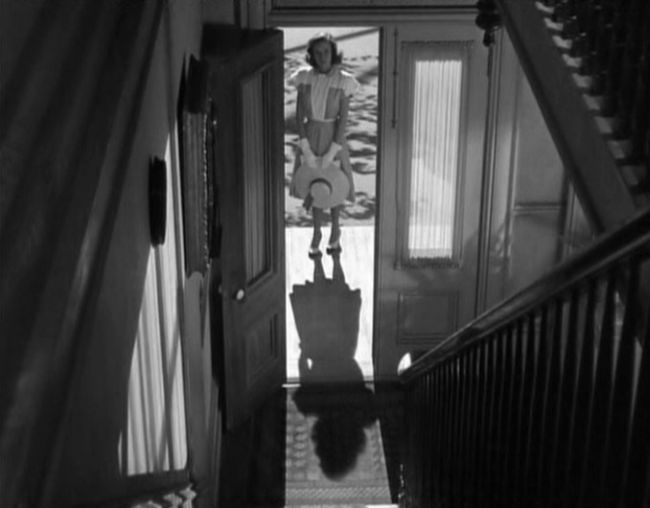
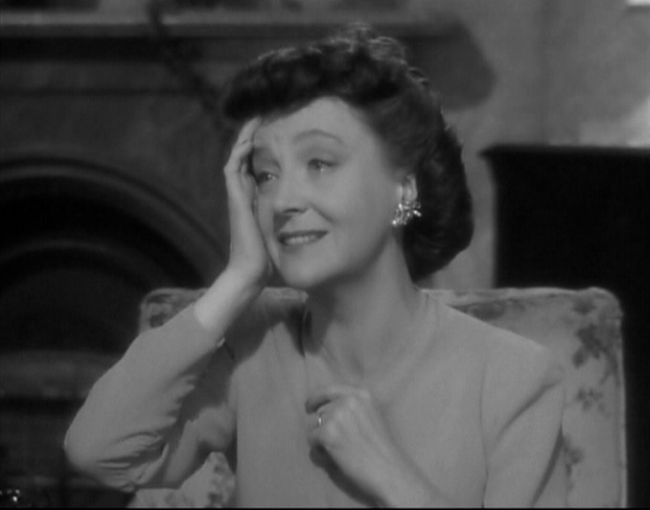
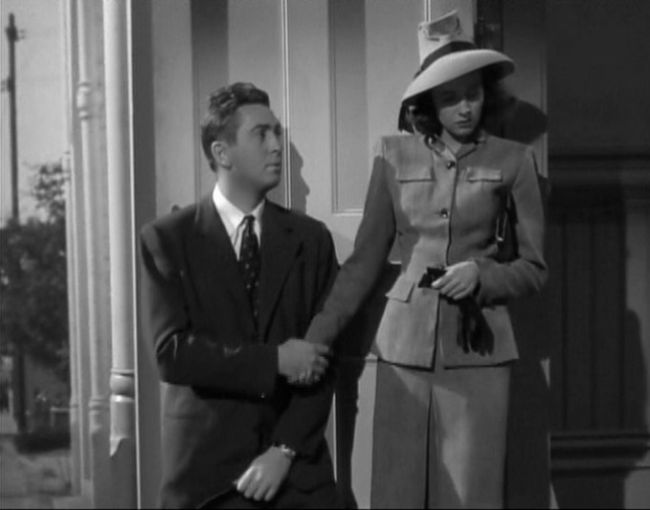
Pingback: THE HITCHCOCK HALLOWEEN BLOGATHON: The Entries | Backlots
Thanks for a great review of one of my favorite Hitchcock’s (after “39 Steps”).
Thanks Fresca! I waver between Shadow of a Doubt and Rope as my favorites on any given day, but I love North by Northwest, Psycho, 39 Steps so much that right after I watch them, I declare THEM to be my favorites too!
Wow, this essay is perfect! A whole thesis / book could be written about women represented in Hitchcock’s films, and you did very well pointing some subjects I never thought of.
Even if sometimes the little sister gets on my nerves, I still enjoy this film imenselly, especially when the father and his friend are planning murder plots.
Don’t forget to read my contribution to the blogathon! :)
Kisses!
Thanks Le! Charlie’s little sister Ann can be a real handful, but I give the actress some slack because she was just a local Hitch happened to spot while scouting locations, and this was her first role.
Charlie’s dad and his friend are both hilarious, and there’s a whole other post to be made about their hypothetical shenanigans!
I am so glad I decided I couldn’t make time for this blogathon, because my contribution would have ultimately been shamed by how splendid this entry is. You have given me much to think about…but then, you always do. Great job, babe.
Thanks, Ivan — as usual, you are far too kind.
What a comprehensive entry – I enjoyed reading it so much! There are so many layers to a Hitch film, every time I watch one I notice or discover something new. His ‘heroines’, and his attitude towards women is something I could discuss all day – as another commentator mentioned it’s a topic that’s just asking for a book!